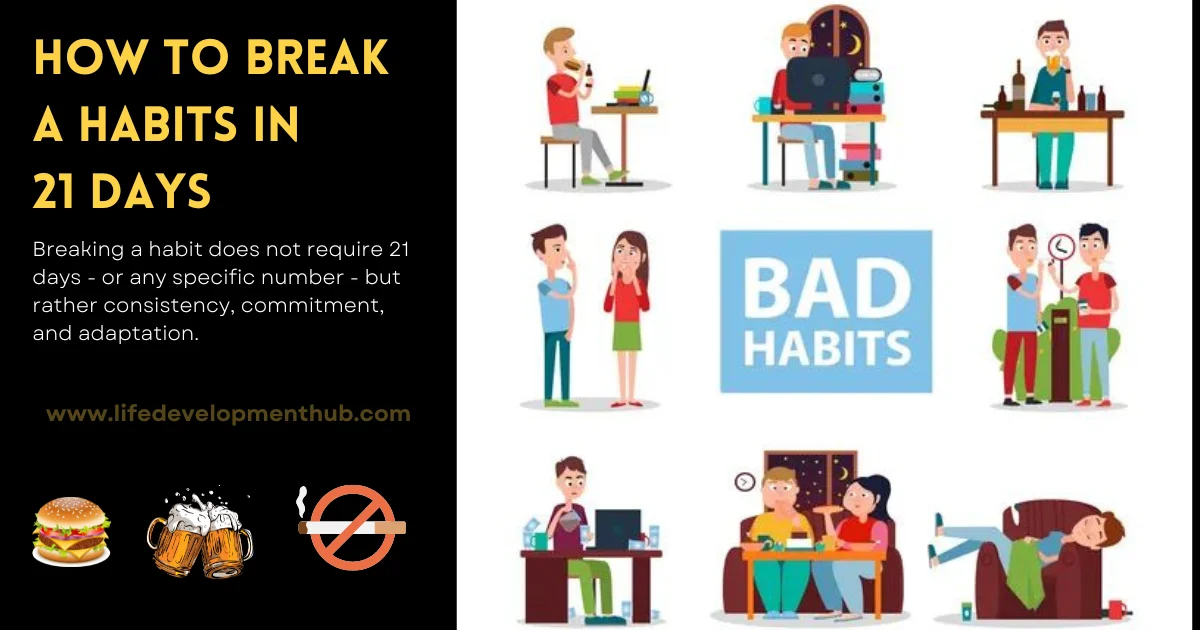Breaking a habit does not require 21 days – or any specific number – but rather consistency, commitment, and adaptation. Understand what lies behind the 21-day habit theory as well as som e helpful techniques for breaking one successfully. break habits in 21 days
You may have heard that 21 days is required to form or break habits – is this accurate? Where did this number come from and what do the scientific facts indicate?
How Can You Break a Habit in 21 Days is a frequently asked question, yet its answer is far more complex than you might imagine. The 21-Day Habit Theory has become popular through self-help books and motivational speakers without being supported by any scientific evidence.
Breaking habits may take more or less than 21 days depending on their nature, person’s environment and rewards; but that does not imply it’s impossible or that strict timelines must be observed to do so.
There are various techniques you can employ to break a habit successfully, such as identifying triggers, altering your environment, seeking an accountability partner and employing a reward system, as well as replacing old behaviors with new ones.
If you want more information about how to break a habit in 21 days and why this number is inaccurate, read my previous article which contains more resources from my web search and further references from experts. Hopefully you find it both informative and intriguing!
The Origins of the 21-Day Habit Theory The idea that it takes 21 days to break a habit can be traced back to plastic surgeon Dr. Maxwell Maltz who published Psycho-Cybernetics in 1960. Maltz noticed his patients taking approximately 21 days to adjust to changes after surgery or following an amputation procedure; similarly he observed this taking effect for himself when adopting new behaviors or attitudes in his life.
However, he did not believe 21 days was a fixed or universal rule for habit formation; rather he suggested it was a minimum amount of time that may vary depending on an individual and his/her circumstances. His theory did not rely on scientific evidence, rather upon personal and professional experience as his basis for action.
Habit Formation Is Rea
Since then, numerous self-help gurus and motivational speakers have popularized the 21-day habit rule, often misinterpreting or oversimplifying it. Their interpretation often makes it seem as if sticking to any goal for three weeks guarantees success in any endeavor. But this is contrary to research findings.
University College London researchers provided evidence-backed timeline for habit formation through a 2009 study, in which they monitored 96 people attempting to change specific behaviors like eating fruit, drinking water or exercising. On average, it took 66 days before these new actions became automatic or habitual, although individual results varied from 18-254 days depending on participants’ involvement and lifestyle factors.
This research shows that breaking or creating habits is an individual experience and depends on various factors, including:
Type and complexity of habit
An individual’s personality and motivation
Environment and Context
Reward and feedback mechanisms.
Attaining lasting results requires being flexible and patient with yourself as opposed to setting expectations of breaking a habit in 21 days, or any set number. Instead, focus on the process and progress and be flexible and patient when working towards breaking it.
Advice and Tricks to Break Habits
Breaking a habit may not be easy, but it is doable with the proper strategies and mindset. Here are a few tricks that may help:
Pinpoint your triggers. A trigger can be defined as anything that prompts a behavior, including time, place, person, mood or thought – such as smoking when stressed or snacking while watching television. By becoming aware of your triggers you can either avoid or replace them with something more suitable.
Alter Your Environment. Your environment has an enormous effect on our habits, so try making it easier for yourself to break them. For example, if you want to stop drinking soda, place it somewhere other than your fridge; or if you want to stop checking your phone too frequently, move it elsewhere in the room.
Find an accountability partner. Having someone support, remind, and motivate you can make all the difference when embarking on your habit change journey. Alternatively, join a group with similar goals, or share your journey on social media
Create a reward system. Reward systems can help to reinforce new behaviors, making them more enjoyable. Give yourself small treats each day or wait to reward yourself until the week or month has ended to make sure your rewards don’t interfere with reaching your goal, such as indulging in cake instead of exercising!
Replace the habit with something better. Instead of just trying to stop doing something, consider replacing it with something that is more beneficial or satisfying – such as chewing gum if you want to stop biting your nails; or reading a book instead of scrolling social media if that helps fill any void left by old habits while creating positive feedback loops.
Breaking a habit doesn’t happen overnight or within any given number of days – it takes consistency, commitment and adaptation over time to achieve results. Success might take longer or shorter than anticipated but as long as you keep trying and learning you will eventually see results. Remember habits are choices – only you have the power to change them and your life!
FAQs (faqs)
Q: How long will it take to break a bad habit?
A: Unfortunately there is no single answer to this question as its results depend on many variables, including habit type, person and environment, as well as rewards received for engaging in them.
Q: Are there any habits people want to break? A: Yes.
A: Some common habits people strive to break include:
Smoking Drinking alcool Eating junk foodBiting nails
Procrastinating And spending too much time staring at screens.
Slumping Alarm Tossing Bed-Bugger
Breaking a habit can bring many advantages, including: Enhancing health and well-being Saving both money and time Building self-esteem and confidence Enhance productivity and creativity Strengthening relationships and social skills. Realize Your Goals and Dreams.
break habits in 21 days

